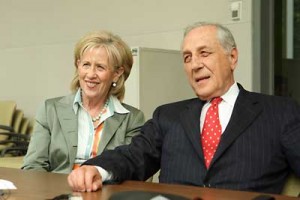
Lecture series aims to demystify cancer and arm public with knowledge
By Neale McDevitt
I pick up the phone to call Rosalind Goodman for a scheduled interview about the first installment of the inaugural lecture series at the Rosalind and Morris Goodman Cancer Centre (GCC), and I hesitate.
It isn’t the lecture series that makes me pause. The pamphlet blurb sounds compelling – a series of four public exchanges with local experts in the field of cancer research that gives people the opportunity to “learn how and why cancer starts, how it develops into a potential killer and how, thanks to research, it is being rendered a chronic disease.”
No, I hesitate because I know that Goodman, McGill grad (BA’63) and benefactor, has lung cancer. Like many people, I stumble and mumble in the face of another’s illness, not quite knowing what to say, how much to say or if I should say anything at all. An elephant walks into my office and plops himself down in the corner.
Our conversation starts off well. Goodman is excited by the lectures and it shows. “I want to put [the GCC] on the map,” she says when I ask her about the genesis of the series. “I thought the best way to do it was to have a lecture series that benefited the public.
“When I was diagnosed they didn’t have anything like this,” she says. The elephant moves and I flinch.
“Yes, you were diagnosed with…um…” I fumble with the words “lung cancer” as if by not uttering them they will disappear.
“Lung cancer,” says Goodman, finishing my sentence in the gracious, matter-of-fact way of someone who has lots of experience defusing other people’s discomfort in dealing with her illness.
“That was two years ago,” she says, “and I’m not coping – I’m thriving.”
Thriving? The word piques my curiosity. I’m healthy and strong as a bull, but I’m not so sure I would describe myself as thriving.
“I was fortunate,” she continues, “I got it at a later stage in my life. I kept thinking about young mothers with young families who get this terrible diagnosis.
“Some people spend a lot of time asking ‘Why me?’ But I said ‘Why not me?'” Now it was the elephant’s turn to look uncomfortable.
And so we talk about cancer. Goodman’s cancer. Her mother’s cancer and her son’s cancer.
Jonathan Goodman was 21 when he was diagnosed with Hodgkin’s lymphoma while studying at the London School of Economics. “In the 1940s, people died of that,” says Goodman. “We celebrated with champagne when we found out it was one of the curable ones.
“Twenty-one years later, he’s doing wonderfully and raising hundreds of thousands of dollars for cancer research.”
And that is Goodman’s recurring theme, and the foundation upon which the lecture series has been built: know your disease and thrive. “Knowledge is power, says Goodman, echoing the words of Nobel Prize laureate James D. Watson who once said, “To fight cancer, know the enemy.”
The four-part series begins on Nov. 9, with Cancer Initiation. A panel of five experts will outline how cancer starts, how it is diagnosed and how to arrest its early development. The session, and the three that follow, will be moderated by Michel Tremblay, Director and Principal Investigator of the GCC.
Goodman hopes that knowledge will help allay the fear that often paralyzes patients and their families. “It can be absolutely devastating news,” she says. “I certainly had a good cry in the car after getting the news following my first CAT Scan. But people have to stay positive – there is so much wonderful research going on, so much out there in the pipeline.
“People have to understand that they aren’t dying of cancer,” Goodman says at the end of the interview, “they are living with it.” I hang the phone up with a smile, never having noticed that the elephant had left long ago.
For more information about the lecture series go to www.cancercentre.mcgill.ca.
